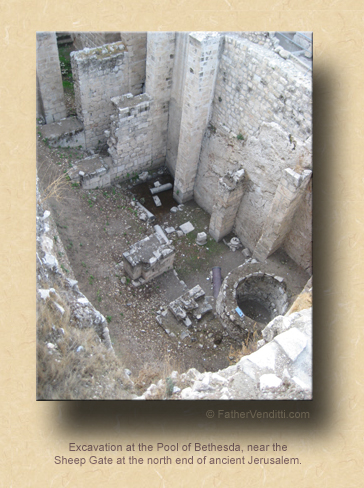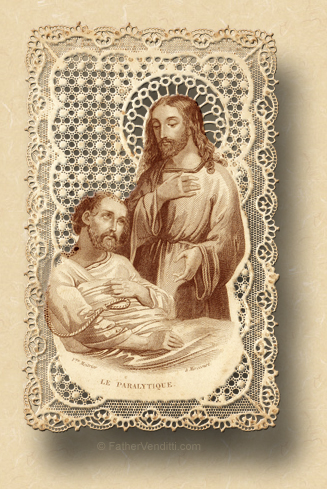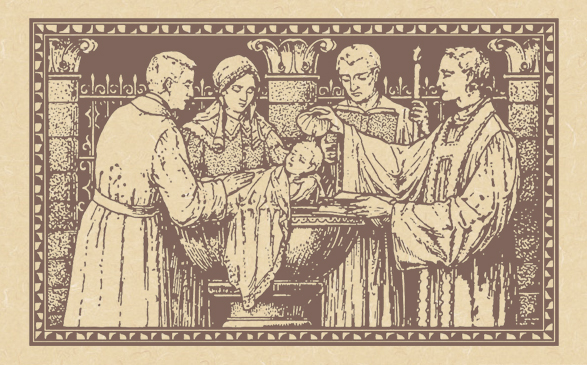A Good Augustinian Always Has His Calculator Handy.
The Fourth Tuesday of Lent; and, the Commemoration of Saint John of God, Religious.*
Lessons from the feria, according to the ordinary form of the Roman Rite:
• Ezekiel 47: 1-9, 12.
• Psalm 46: 2-3, 5-6, 8-9.
• John 5: 1-16.
The Fourth Tuesday of Lent; and, the Commemoration of Saint John of God, Confessor.
Lessons from the feria, according to the extraordinary form of the Roman Rite:
• Exodus 32: 7-14.
• Psalm 43: 26, 2.
• John 7: 14-31.
The Fifth Tuesday of the Great Fast; and, the Feast of Our Venerable Father & Confessor Theophylact.**
Lesson for the Sixth Hour with Holy Communion,*** according to the Ruthenian recension of the Byzantine Rite:
• Isaiah 40: 18-31.
FatherVenditti.com
|
 7:27 AM 3/8/2016 — Once again, water figures prominently in our Scripture lessons, both in the first lesson from Ezekiel and in our Gospel, and with it the Sacrament of Baptism, only this time the gentleman our Lord meets never gets wet. He doesn't have to. 7:27 AM 3/8/2016 — Once again, water figures prominently in our Scripture lessons, both in the first lesson from Ezekiel and in our Gospel, and with it the Sacrament of Baptism, only this time the gentleman our Lord meets never gets wet. He doesn't have to.
The place described in today’s Gospel lesson is unique. If we had to, we could compare it to Lourdes in France, where so many Christians have claimed to be cured at the miraculous stream. It was, in fact, a pool of some sort by one of the gates of Jerusalem. This particular site was excavated not long ago;—less than 75 years ago—and one of the men who first excavated this site was from my home town. He was a Baptist minister, and he brought back with him from this site a stone from the pool of Bethesda which, today, is visible embedded in the plaster over the archway leading into the baptistery of the First Baptist Church of Bethesda, Maryland. Hence, the town’s name.
In reality, this place was clearly some kind of hot spring connected naturally to some sort of underground source in such a way that, at regular intervals, the water would bubble and churn. And the pious legend among those who lived thereabouts was that the water was being stirred by an angel; and if someone were to be the first to descend into the water at the time this was happening, that person would be cured of whatever ailed him. Why you had to be the first no one knows, but apparently it didn't work if you were the second or the third.
So, Jesus goes to this place. We don’t know why, exactly. Maybe it’s simply because He knew there would be a great number of sick people there, and we know how our Lord likes to gravitate toward the needy. And there He encounters this man. He’s very sick indeed, crippled, in fact; so much so that there would seem to be no chance that he could ever be the first to get into the pool at the time the waters were stirred.
Now, this man has been sick a long time: thirty-eight years. Saint Augustine, in a beautiful passage presented in Matins for Ember Friday in Lent (Treatise 17 on John), when this lesson was read in the extraordinary form, points out the significance of this number, particularly as it pertains to our sojourn through Lent: Moses and Elijah both fasted for forty days, as did our Lord, thus our fast during Lent is also forty days. But, our Lord points out that there are two commandments on which the whole law and prophets depend (Matt. 22: 40); likewise the widow who gave all she had: two small coins (Mark 12: 44); and, the innkeeper who who received two silver pieces for the care and healing of the wounded traveler brought to him by the Good Samaritan (Luke 10: 35); and, our Lord's own stopover among the Samaritans for two days to bring them the Word of God (John 4: 40); thus, it is not surprising that forty, lacking the number that signifies charity—two—results in sickness. Thirty-eight years. You can file that under "esoteric information upon which to meditate in a dull moment."
 In any case, that’s a long time to be going to this pool and not being able to get into the water. I wonder how many of us would have that kind of perseverance. I venture to say that not too many of us, if we were crippled like this man, and if we thought we could be cured by being the first to be dunked into a pool, would keep trying it every day for thirty-eight years without becoming discouraged and giving up. And perhaps that is the very reason that our Lord singles this man out and helps him: because of his perseverance—because he never gave up. In any case, that’s a long time to be going to this pool and not being able to get into the water. I wonder how many of us would have that kind of perseverance. I venture to say that not too many of us, if we were crippled like this man, and if we thought we could be cured by being the first to be dunked into a pool, would keep trying it every day for thirty-eight years without becoming discouraged and giving up. And perhaps that is the very reason that our Lord singles this man out and helps him: because of his perseverance—because he never gave up.
Of course, our Lord didn’t need the stirring of the waters to cure this man. But what would have happened if the man had allowed himself to become discouraged? He wouldn’t have been at the pool that day and, consequently, he wouldn’t have met our Lord; thus, he wouldn’t have been cured. Now, that’s a very simple lesson, but a very important one. How often do we sit in front of the TV with the remote and flip through the channels because everything we see isn’t what we want to see, in spite of the fact that we’ve got 500 channels there? And the more they give us, the more we discover how much more there is that we don’t want to see. Ours is a society which breeds impatience. The more that is provided for us at the touch of a button, the more we want. And we become conditioned to want everything right now. Only the more that is provided for us, the more we learn that none of it is really what we want. And then this starts to infect our interior life.
So, we want something from God. Perhaps it’s good health, like the man in the Gospel. Perhaps it’s something for somebody else, like our spouse or our children. But whatever it is, we want it now. We launch our prayers off to heaven as if we’re pushing buttons on a remote control, and then we wait for the channel to change—for the circumstances of our life to improve and for God to give us what we want. Did you ever have that feeling when you’re in front of the TV and you’re pushing the buttons and nothing is happening? And you wonder if the batteries are dead, or if it’s not pointed in the right way. We do this with our prayers. Then we begin to second guess God: “What did I do wrong?” Maybe we didn’t do anything wrong. Maybe we just have no patience.
So, how long is too long to wait for an answer from God? Well, I don’t know. The man at the pool of Bethesda waited for thirty-eight years. And during all that time he never lost faith that, one day, God would deliver him from his illness. If he had lost faith, he would have stopped coming to the pool, and would never have met Jesus. Maybe you’re coming here to Mass day after day, and maybe you’re life is a mess and you want it not to be, and you’re waiting for God to do something to help you. How long must you wait? I don’t know. Maybe thirty-eight years. Maybe thirty-eight hours. Maybe a life time. But I do know that if you give up and go home, it will never happen.

* St. John of God (1495-1550) was successively a farmer, soldier and merchant before, at the age of forty, he heeded a call to holiness and lived at the service of the sick in Granada, Spain, founding a religious congregation of brothers dedicated to the care of the sick, known after his death as the Order of Brothers Hospitallers of St. John of God, today numbering about 1200 religious world wide. John of God is venerated as the patron saint of hospitals, nurses, the sick and booksellers (one of his previous trades).
** In the Byzantine Tradition, Lent begins on a Monday, not a Wednesday; thus, today is the fifth Tuesday of the season, not the fourth.
Theophylact (or Theophilactus) was Metropolitan of Nicomedia. He was exiled by the Emperor Leo the Armenian in 815 during the Iconoclastic persecution. He died in 845.
*** In the Byzantine Tradition—as in most Eastern Christian traditions, both Orthodox and Catholic—the Eucharist is not celebrated on the weekdays of the Great Fast. In some traditions, the faithful are expected to fast from the Blessed Eucharist during this time, abstaining from Holy Communion except on Saturdays and Sundays.
In other traditions, including the Ruthenian recension, Holy Communion may be distributed to the faithful daily provided that the Divine Liturgy is not celebrated. On Wednesday and Friday evenings, the Divine Liturgy of Presanctified Gifts is celebrated, consisting of a form of Solemn Vespers coupled with a Communion Service in which the Eucharist confected on the previous Sunday may be received by the faithful. On the other weekdays, another service—usually the Sixth Hour of the Divine Office or a simpler service called "Typica"—may be celebrated at which Holy Communion may also be offered to the faithful. Notice that the readings for these services do not include a Gospel lesson; a Gospel would only be sung on significant Holy Days or during the Presanctified Liturgies of Holy and Great Week.
|

